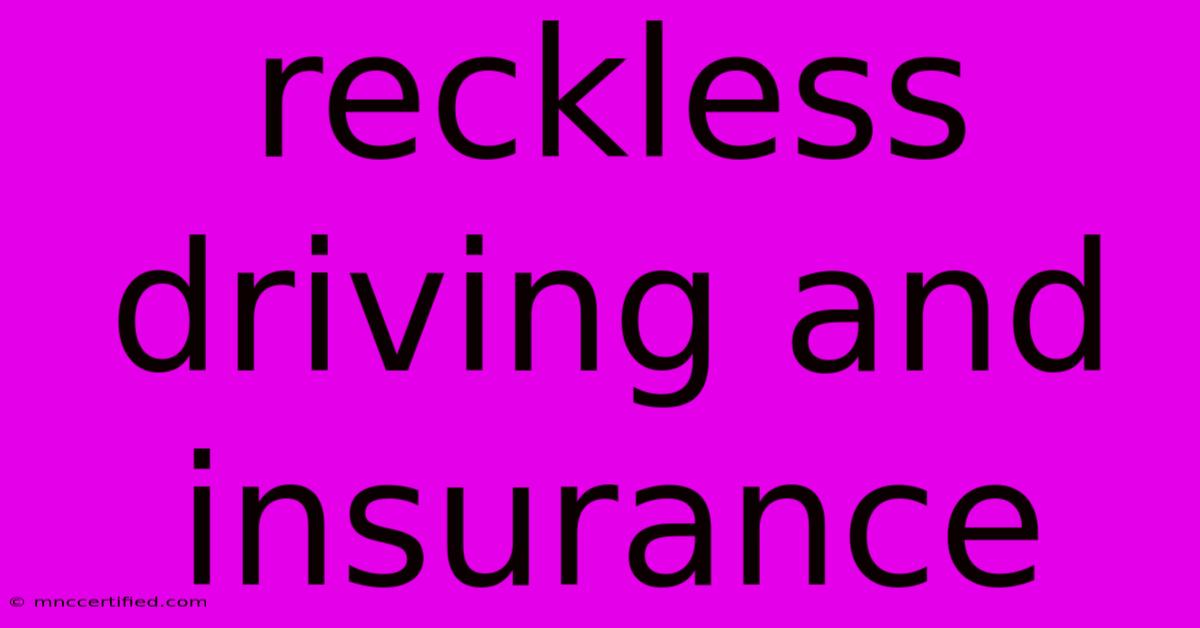Reckless Driving And Insurance

Table of Contents
Reckless Driving and Your Insurance: A Risky Equation
Reckless driving is more than just a traffic violation; it's a serious offense with potentially devastating consequences, impacting not only your driving record but also your car insurance premiums. Understanding the link between reckless driving and insurance is crucial for every driver. This article delves into the specifics, explaining what constitutes reckless driving, its impact on your insurance, and how to mitigate the risks.
What is Considered Reckless Driving?
Reckless driving goes beyond simple speeding or running a red light. It involves a conscious disregard for the safety of others. Specific actions considered reckless driving can vary by state, but generally include:
- Excessive speeding: Significantly exceeding the posted speed limit, often by a substantial margin.
- Aggressive driving: Tailgating, weaving through traffic, sudden lane changes without signaling, and other aggressive maneuvers.
- Street racing: Participating in illegal street races or speed contests.
- Driving under the influence (DUI): Operating a vehicle while intoxicated by alcohol or drugs. This is often considered a separate, more serious offense.
- Ignoring traffic signals and signs: Consistently disregarding traffic laws and regulations.
- Racing: Participating in any form of unauthorized racing.
- Dangerous maneuvers: Performing stunts or maneuvers that endanger others, such as drifting or donuts.
The key element is the demonstration of willful disregard for safety. A single instance of speeding might be a simple moving violation, but repeated offenses or actions demonstrating a blatant disregard for safety will likely be classified as reckless driving.
The Impact on Your Car Insurance
The consequences of a reckless driving conviction on your car insurance are significant and far-reaching:
- Increased premiums: Expect a substantial increase in your insurance premiums. Insurers view reckless drivers as high-risk, leading to higher costs to cover potential claims. The increase can be substantial, sometimes doubling or even tripling your premiums.
- Policy cancellation: In severe cases, your insurance company may cancel your policy altogether, leaving you without coverage. This is especially true for repeat offenses or extremely dangerous driving behaviors.
- Higher deductible: Your insurer may raise your deductible, meaning you'll have to pay more out-of-pocket before your insurance coverage kicks in.
- Difficulty obtaining insurance: Finding new insurance after a reckless driving conviction can be challenging. Insurers may be reluctant to offer you coverage, or they may only offer it at exorbitant rates.
- SR-22 requirement: Some states require drivers convicted of reckless driving to file an SR-22 form, which proves they have the minimum required insurance coverage. This form is filed with the state's Department of Motor Vehicles (DMV).
Preventing Reckless Driving Charges
The best way to avoid the negative consequences of reckless driving is to drive responsibly and safely. This includes:
- Obeying all traffic laws: Follow speed limits, traffic signals, and signs.
- Maintaining a safe following distance: Give yourself ample space between your vehicle and the car in front of you.
- Avoiding aggressive driving behaviors: Drive calmly and courteously, avoiding sudden maneuvers and tailgating.
- Never driving under the influence: Designate a driver or use a ride-sharing service if you plan to consume alcohol.
- Regular vehicle maintenance: Ensure your vehicle is in good working order to prevent unexpected mechanical issues that could lead to accidents.
What to Do After a Reckless Driving Charge
If you've been charged with reckless driving, take immediate action:
- Consult with a lawyer: A qualified attorney can help you understand your rights and navigate the legal process.
- Gather evidence: Collect any information that could support your defense, such as witness statements or dashcam footage.
- Contact your insurance company: Notify your insurer about the charge as soon as possible. While this might lead to increased premiums, honesty is crucial.
Reckless driving is a serious offense with lasting repercussions on your insurance and driving record. By understanding the risks and driving responsibly, you can protect yourself, others, and your insurance premiums. Remember, safe driving is not just a matter of avoiding tickets; it's about responsible behavior on the road.

Thank you for visiting our website wich cover about Reckless Driving And Insurance. We hope the information provided has been useful to you. Feel free to contact us if you have any questions or need further assistance. See you next time and dont miss to bookmark.
Featured Posts
-
2025 Uk Extra Bank Holiday Possible
Nov 27, 2024
-
Uk Elizabeth Line Partially Suspended
Nov 27, 2024
-
Ohio Lottery Pick 3 Mega Millions Nov 26 2024 Results
Nov 27, 2024
-
Zim Vs Pak Highlights 10 Run Pakistan Win
Nov 27, 2024
-
Southern Insurance Valdosta Ga
Nov 27, 2024